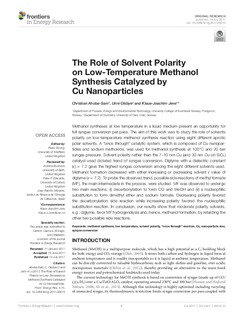| dc.contributor.author | Ahoba-Sam, Christian | |
| dc.contributor.author | Olsbye, Unni | |
| dc.contributor.author | Jens, Klaus-Joachim | |
| dc.date.accessioned | 2018-06-05T09:07:06Z | |
| dc.date.available | 2018-06-05T09:07:06Z | |
| dc.date.created | 2017-11-02T19:00:12Z | |
| dc.date.issued | 2017 | |
| dc.identifier.citation | Frontiers in Energy Research. 2017, 5 (July), 1-11. | nb_NO |
| dc.identifier.issn | 2296-598X | |
| dc.identifier.uri | http://hdl.handle.net/11250/2500287 | |
| dc.description.abstract | Methanol syntheses at low temperature in a liquid medium present an opportunity for full syngas conversion per pass. The aim of this work was to study the role of solvents polarity on low-temperature methanol synthesis reaction using eight different aprotic polar solvents. A “once through” catalytic system, which is composed of Cu nanoparticles and sodium methoxide, was used for methanol synthesis at 100°C and 20 bar syngas pressure. Solvent polarity rather than the 7–10 nm Cu (and 30 nm Cu on SiO2) catalyst used dictated trend of syngas conversion. Diglyme with a dielectric constant (ɛ) = 7.2 gave the highest syngas conversion among the eight different solvents used. Methanol formation decreased with either increasing or decreasing solvent ɛ value of diglyme (ɛ = 7.2). To probe the observed trend, possible side reactions of methyl formate (MF), the main intermediate in the process, were studied. MF was observed to undergo two main reactions; (i) decarbonylation to form CO and MeOH and (ii) a nucleophilic substitution to form dimethyl ether and sodium formate. Decreasing polarity favored the decarbonylation side reaction while increasing polarity favored the nucleophilic substitution reaction. In conclusion, our results show that moderate polarity solvents, e.g., diglyme, favor MF hydrogenolysis and, hence, methanol formation, by retarding the other two possible side reactions. | nb_NO |
| dc.language.iso | eng | nb_NO |
| dc.relation.uri | https://www.frontiersin.org/articles/10.3389/fenrg.2017.00015/full | |
| dc.rights | Navngivelse 4.0 Internasjonal | * |
| dc.rights.uri | http://creativecommons.org/licenses/by/4.0/deed.no | * |
| dc.title | The Role of Solvent Polarity on Low-Temperature Methanol Synthesis Catalyzed by Cu Nanoparticles | nb_NO |
| dc.type | Journal article | nb_NO |
| dc.type | Peer reviewed | nb_NO |
| dc.description.version | publishedVersion | nb_NO |
| dc.rights.holder | 2017 Ahoba-Sam, Olsbye og Jens. | nb_NO |
| dc.source.pagenumber | 1-11 | nb_NO |
| dc.source.volume | 5 | nb_NO |
| dc.source.journal | Frontiers in Energy Research | nb_NO |
| dc.source.issue | July | nb_NO |
| dc.identifier.doi | 10.3389/fenrg.2017.00015 | |
| dc.identifier.cristin | 1510522 | |
| dc.relation.project | Norges forskningsråd: 228157/O70 | nb_NO |
| dc.relation.project | NORTEM: 197405 | nb_NO |
| cristin.unitcode | 222,58,3,0 | |
| cristin.unitname | Institutt for prosess-, energi- og miljøteknologi | |
| cristin.ispublished | true | |
| cristin.fulltext | original | |
| cristin.qualitycode | 1 | |

